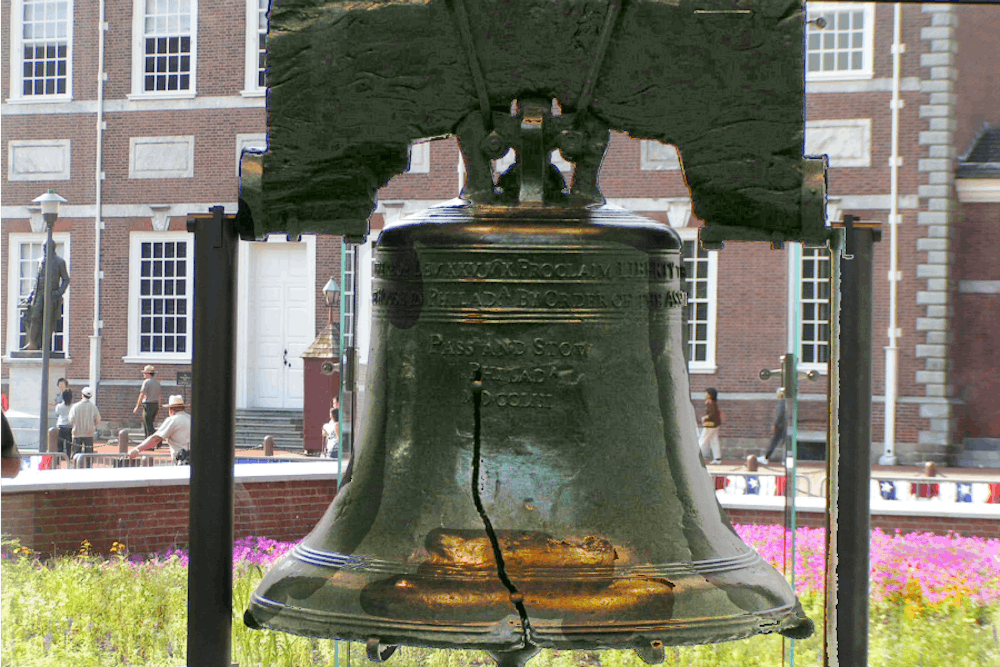Creative Commons photo
By Eric Niehaus, niehaues@miamioh.edu
I think we have a misguided notion as to what, exactly, freedom is. People talk about it as if it's something that's nationally given; I think it's individually achieved. People act on it as if it's something that will always be there; I think we're losing it.
We've been lulled into a state of complacency because we've never not had freedom. And since we've never known a world without it, it's insanely difficult for us to understand it - it's like fish trying to understand water: not until you take it away will they fully comprehend what it is and how vitally important it is.
In a broad way, freedom is defined as the power or right to act, speak or think as you want without hindrance or restraint. But already this definition is wrong: the hindrances and restraints act on every individual, albeit likely unperceived. From obvious economic and social constraints to non-obvious constructs, no individual is free from all constraints.
We're all slaves to a thousand different constraints, the binds of which can be at least significantly fractured simply by acknowledging them. Freedom from constraints, in a seemingly illogical but truly practical sense, is in part the acceptance of and operation within the structure of reality-the conscious assertion of one's will within the confines of possibility. In order to achieve true, practical freedom we must acknowledge our constraints. Freedom is not the ability to do whatever one wishes; it is building a house in whichever way you see fit, given the constraints of time, money, and materials. This acknowledgement and willingness to work within the confines of restraints is the first step toward personal responsibility and empowerment.
Freedom is cousin to independence - that being dependence on one's self - which then necessitates personal responsibility. Consequently, any action taken to remove all sense of personal responsibility is an attack on freedom. To take personal responsibility from the hands of the people is to strip them of their right to be free. Freedom is only possible when people act on their own, as detached as possible from the influences of a third party.
As an example, our government has, for as long as it has existed, failed to make our society perfectly economically egalitarian.
It is therefore in the best practical interest of the individual to acknowledge this situation and to not rely on government - that dependence being counter to freedom, anyway - and to instead rely on his/her own capacities of determination, intelligence and hard work. Freedom, as we perceive it, is the ability to make decisions without restraints. How possible is this if our citizens come to depend so heavily on government? What effect does this have but to incapacitate our persons, robbing them of the possibility of empowerment? The role of the government is to empower its citizens, not -though admittedly, unintentionally - create incentives leading them to choose no work over work, or dependence over independence.
So, what is freedom? Is it something to be fought hard for once, penned into writing and then assumed to be forever held constant? No, freedom, in this sense, cannot be given or in any way guaranteed - it is only through the assertion of one's self in the form of separation from reliance on another - in this example, government - that one may attain what is closest to true freedom. Until that point, we are slaves under the guise of Free Men, working under the deceptive influence of an oppressive regime operating under the guise of an assisting and liberating government.
Let me be clear: this is not so much about government as it is about the nature of freedom. As persons, we crave security - it is safe, comfortable and consistent. But security means secure, which is synonymous with 'fixed.' Perhaps the most potent question of all is this: do we, as people, even want freedom? Do we not trade in our dreams for a little more "security," clipping our own wings for the sake of "being realistic?"
We are averse to uncertainty and what is more uncertain than being free to have to make our own decisions? Maybe security is actually the antithesis of freedom, in one sense. We all at least recognize our constraints, but it is not until we willfully acknowledge and act on them that we begin to become empowered toward independence and thus freedom.
It is not until we joyfully embrace personal responsibility and cut the nurturing cord of security and dependence that we will ever truly achieve liberation. Until then, we are just fooling ourselves, fabricating a reality most conducive to the comfortable life we wish to lead - one of blissfully ignorant security. One in which we willingly forfeit freedom.

